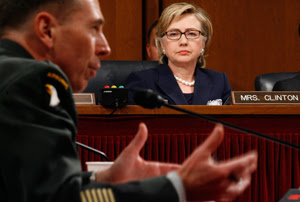 Two opinion pieces appeared in the Washington Post yesterday on the status of Iraq. One was a jointly written article by Fred Kagan of AEI, Michael O'Hanlon of the Brookings Institute, and retired General Jack Keane. Its a straightforward look at the successes we have had in Iraq, the many problems yet to overcome, and a warning against withdrawing troops too quickly as al Qaeda attempts to regroup and Iran continues its deadly meddling. You can find it here.
Two opinion pieces appeared in the Washington Post yesterday on the status of Iraq. One was a jointly written article by Fred Kagan of AEI, Michael O'Hanlon of the Brookings Institute, and retired General Jack Keane. Its a straightforward look at the successes we have had in Iraq, the many problems yet to overcome, and a warning against withdrawing troops too quickly as al Qaeda attempts to regroup and Iran continues its deadly meddling. You can find it here.
The second article is by Andrew Bacevich, a professor of International Relations at Boston University. Bacevich posits all of the arguments of the hard left for leaving Iraq immediately. And it is not surprising at all to find that the ostensible arguments he posits wholly sidestep the recent successes in Iraq.
When problems appeared in Iraq following al Qaeda's bombing of the Mosque of the Golden Dome in February 2006, the argument made forcefully by Harry Reid and company was that Iraq was in the middle of a civil war and thus, we needed to leave. At the start of the surge in January 2007, the left adopted the argument that the surge would be a failure. The left reached their nadir in April, 2007 when Harry Reid preemptively declared America defeated by four suicide al Qaeda bombers. Then, by September 2007, with the three month old "surge" clearly starting to have effect, we were treated to the odious Hillary Clinton accusing, in so many words, General Petraeus of lying before Congress. Once it became clear beyond dispute that Iraq was experiencing a giant stride forward in security, the argument became that the Iraqi government was not making any progress towards passage of the benchmarks - with the one central to the left's argument being political progress to bring Sunni's into the government through de-Baathification. And now with that bench mark in large measure met, the far left, represented in the pages of the Washington Post today by Mr. Bacevich, simply come up with new arguments - and as always, hiding the true justification, partisan political gain and establishing the dominance of the leftist foreign policy agenda.
Bacevich's main points are that we should not have invaded Iraq, that the surge is meaningless, and that continued "persistence" in Iraq will "only compound the blunder." As a threshold matter, whether to invade Iraq is a question with relevance today only to history professors. To any who still raise that argument, it is the penultimate red herring. Pulling out of Iraq precipitously in order to satisfy some nagging guilt rather than in consideration of our national security and other concerns would be irresponsible in the extreme. Yet such is the very first argument of the left.
Mr. Bacevich's criticism of the surge is particularly disingenuous. The purpose of the surge was to bring security to Iraq and quell what appeared to be a nascent civil war with foreign elements of al Qaeda and Iran being the driving forces. In that, it has been a success beyond the most optimistic projections but a year ago. Interestingly, Mr. Bacevich does not contest the gains in security, but takes the position that these improvement are meaningless. ". . . what exactly has the surge wrought? In substantive terms, the answer is: not much.
As the violence in Baghdad and Anbar province abates, the political and economic dysfunction enveloping Iraq has become all the more apparent.
The recent agreement to rehabilitate some former Baathists notwithstanding, signs of lasting Sunni-Shiite reconciliation are scant.
The cynicism apparent in those statements is rather breathtaking. He refuses to credit the security gains of the surge, he takes no note of the normalcy that has returned to the majority of Iraq, and he quite disingenuously refuses to acknowledge either the economic growth that is taking place in Iraq or the political reconciliation that just took place at the Parliamentary level. The Sunni legislators themselves were quite happy with the law they helped pass. Evidently Mr. Bacevich knows more about this than the Sunni legislators themselves. And as to the economy of Iraq, we got a brief snapshot of that aspect of Iraq recently from Michael O'Hanlon at the Brookings Institution
: Inflation is within reasonable bounds. Oil revenues are up quite a bit due to the price of petroleum, even if production has increased only very gradually. Due largely to the improved security environment, electricity production and distribution finally took a substantial step forward in 2007, for the first time since the 2003 invasion. Without even counting the informal electricity sector, which has itself grown, official numbers have increased 10 percent to 20 percent. Cell phone ownership and usage have gone through the roof; national port capacity has increased substantially; the Internet is making real inroads.
You can read the hard numbers and view the graphs at the DOD's quarterly report on Iraq issued in December.
Mr. Bacevich sneeringly compares Iraq to the successful nation-building projects, such as post-war Germany and Japan. Such is an incredibly superficial comparison that does not even acknowledge the time frame's involved in Germany and Japan. In the case of Germany, it had started war in 1939, it surrendered in 1945 and remained under military rule for four years afterward. During the war, its military capacity was wholly destroyed. A similar situation of course occurred with Japan, and we did not end our military occupation of that country until 1952. In Iraq, we did not destroy their military in set battles in 2003; rather, their military and militias melted away only to start taking part in hostilities later. If Mr. Bacevich wishes to make comparisons to nation building in Germany and Japan, he needs to start from the intellectually honest position of the time frames involved. Further, he needs to acknowledge that neither Germany nor Japan faced the massive problems of an al Qaeda insurgency or an expansionist Iran on its border whose primary tool of statecraft is terrorism.
Mr. Bacevich even attempts to pose the Anbar Awakening and awakening movements throughout Iraq as a negative. As he puts it:
By offering arms and bribes to Sunni insurgents -- an initiative that has been far more important to the temporary reduction in the level of violence than the influx of additional American troops -- U.S. forces have affirmed the fundamental irrelevance of the political apparatus bunkered inside the Green Zone.
This completely mischaracterizes the Sunni Awakening - a movement that had at its heart a rejection of al Qaeda. This is at least as intellectually dishonest as claiming that a Democratic electoral victory in 2006 was the cause of the Anbar Awakening. Further, those Sunnis fighting against al Qaeda are seeking to take a role in Iraqi politics. To claim that the Anbar Awakening somehow renders the central government irrelevant is nonsensical.
And Bacevich's next argument is equally incoherent. He posits:
In only one respect has the surge achieved undeniable success: It has ensured that U.S. troops won't be coming home anytime soon.
I won't bother quoting the paragraphs that follow that argument. You can read it for yourself and see if you can make any sense of it. As near as I can tell, Bacevich is merely complaining that the success of the surge means that Democrats won't be able to muster the votes to legislate defeat in Iraq.
Lastly, Mr. Bacevich dusts off the old Democratic talking points and pulls out all of the anti-war arguments used to date. According to Mr. Bacevich, the war in Iraq has:
. . . boosted anti-Americanism to record levels, recruited untold numbers of new jihadists, enhanced the standing of adversaries such as Iran and diverted resources and attention from Afghanistan, a theater of war far more directly relevant to the threat posed by al-Qaeda. Instead of draining the jihadist swamp, the Iraq war is continuously replenishing it.
The anti-Americanism meme is the particularly ridiculous. Anti-Americanism did not arise because of the Iraq War, and if anything, we have seen an improvement in how America is perceived as we are seen as succeeding in Iraq. Name for me the last French President to be so openly pro-American as Sarkozy, or the last German President to be as openly pro-American as Merkel. Two, shall we base our foreign policy and national security decisions on public opinion polls in Europe? The anti-american argument is sheer sophisty.
As to his next argument, that Iraq has resulted in the recruitment of "untold numbers of jihadists," can Bacevich, who is applauding the war in Afghanistan, name a single jihadist who was recruited that would not have been so motivated had we only gone to war in Afghanistan? Further, can Bacevich even begin to imagine how robust jihadi recruitment would have been had we reacted ineffectually to 9-11? Or can Mr. Bacevich tell us what will happen to jihadi recruitment if we legislate a victory in Iraq for al Qaeda or Iran? We can pack up and leave Iraq tomorrow, and if it has any effect on jihadi recruitment, it will only be to send it through the roof as the radical clerics claim that only the hand of Allah could have delivered unto them this victory over the Great Satan who had the brave jihadists all but destroyed in Iraq.
Lastly, the tired meme that Afghanistan is more central to the fight of al Qaeda certainly conflicts with the statements of bin Laden and his no. 2, Zawahiri. But why give their open proclomations any weight in the matter when it would conflict with a far left talking point? As to Afghanistan, I defy Mr. Bacevich to tell us how, in any way, abandoning Iraq will assist with the war in Afghanistan. The problem in Afghanistan is really a problem of safe havens in Pakistan. And that is not, at the moment, something we can effect by taking troops out of Iraq.
Mr. Bacevich's arguments are notable for two points. One, they mark the latest evolution in ostensible arguments by the far left for surrendering Iraq as soon as possible. Two, Bacevich does not address the single most important question - what would be the long term ramifications for our nation if we legislatively surrender Iraq to al Qaeda and Iran? Mr. Bacevich I think is either intellectually dishonest or too blinded by partisanship to make valid arguments that consider the long term ramifications.
Lastly, Mr. Bacevich makes for an unusual member of the far left. True, he works in academia, but he is a retired Army Colonel, and a man whose son died fighting in Iraq. In that respect, and wholly apart from my significant disagreements with his arguments above, I wanted to acknowledge his service to our country and to express my sympathy for his loss.
You can find Mr. Bacevich's article here.
Read More...
Summary only...
































































